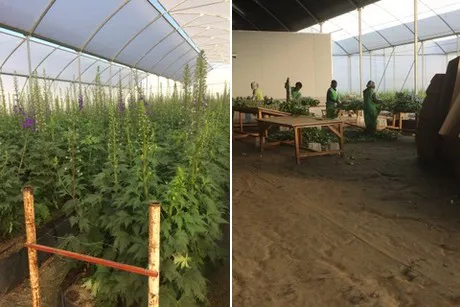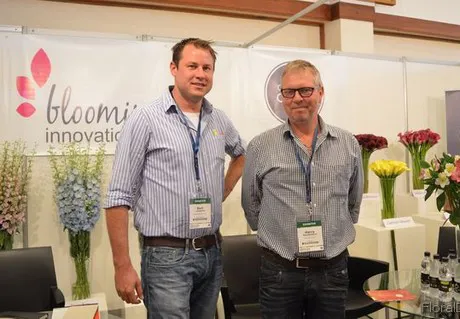
The delphinium greenhouse.
Expansion greenhouse
In 2015, after growing hydrangeas for one year, Rooijakkers and Louwerse decided to add Delphiniums and started growing six varieties in a 1ha greenhouse. After one year of growing delphiniums and after noticing an increase in demand, they decided to expand the production. So, last year, Rooijakkers and Louwerse established an exact copy of their existing 1ha Delphinium greenhouse. The new 1ha greenhouse was finished in September and in December, they could harvest their first flowers. It enables them to double their delphinium production and guarantee a continuous supply throughout the year.
Market not saturated
However, according to Rooijakkers, the market is not saturated yet. "We supply delphiniums when many Dutch delphinium growers are out of production. Increasingly more people are now becoming aware of the product, so the demand seems to continue to rise." And even now, when having the production doubled, Rooijakkers is pleased with the demand and prices at the Dutch auction, which is their main market during this time of the year. "The flowers are supplied to this auction and are distributed all over Europe and the UK afterwards. In the summer period, when the Dutch growers start to increase their volumes to the auction, we shift to supplying the worldwide market directly, where we sell to countries in the Middle East, Far East (China), India and Australia", explains Rooijakkers. Also in these direct markets, he notices an increase in demand. "More often we receive requests from flower buyers in China. But also our current hydrangea buyers are willing to purchase our delphiniums. We added a bunch of delphiniums in some of their hydrangea orders, so they could trial them. Many of them were pleased with the results and are now considering adding delphiniums."

Bert Louwerse and Harry Rooijakkers at the IFTEX 2016.
What makes Kenyan delphiniums so special?
The year round availability of the delphiniums is not the only reason for their success, exclusivity and quality are playing an -and maybe even more- important role too. According to Rooijakkers, not many growers cultivate this particular delphinium. "It has double flowers and large stems. Many other delphiniums are seed grown and therefore less tall, often up to 90cm. Ours are over 90 to 120cm. Nico Wiegert, the breeder of the delphinium we grow, grows them too and one or two others, in the Netherlands." Besides that, Rooijakkers points out the importance of quality. "Trust is hard to gain but easy to lose", he says. "So, the flowers need to be perfect and need to have a long shelf life, if not, we rather throw them away." And this approach seems to be well-accepted. "The feedback we get is positive." And this is also noticeable at the auction in the Netherlands. "Our long stems are often double and sometimes even triple the price of the shorter stems."
Increasing production in the future?
The market does not seem to be saturated yet, so plenty of opportunity to keep expanding the production, isn't it? "It all depends on the supply and demand on the market. We will await the sales this coming summer and then decide how to proceed. But if the demand continues to increase, we will definitely consider another expansion."
For more information

Blooming Innovations
Harry Rooijakkers
Email: bloominginnovations@gmail.com
www.blooming-innovations.com
